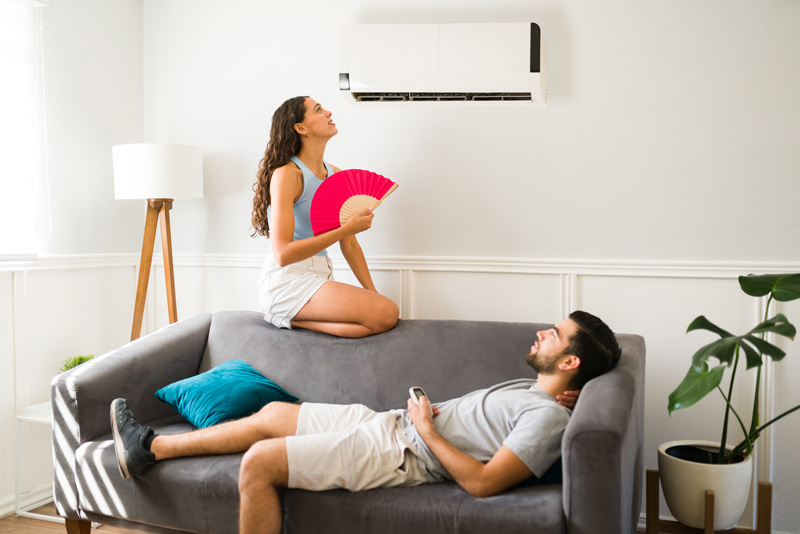AC Not Working? Here’s Why and How to Fix It
Is your AC not working when you need it most on sweltering hot days?
When your air conditioner stops blowing cold air, it can turn your home into an uncomfortable space, especially during summer. Understanding why your air conditioning system has stopped working properly is essential for homeowners who want to avoid higher energy bills and costly repairs. This troubleshooting guide will help you diagnose the problem and determine whether a simple fix or professional HVAC assistance is needed.
Your AC system pulls warm air through an air filter that removes dust and debris. The filtered air reaches the evaporator coil, where liquid refrigerant absorbs heat. Your AC compressor, located in the outdoor unit, compresses refrigerant gas and sends it to the condenser coil to release heat outside. The refrigerant passes through an expansion valve or expansion device before returning to the evaporator, completing the refrigeration cycle. No matter how well designed, all components must work together properly.
Most Common Causes of AC Not Working
Thermostat Problems
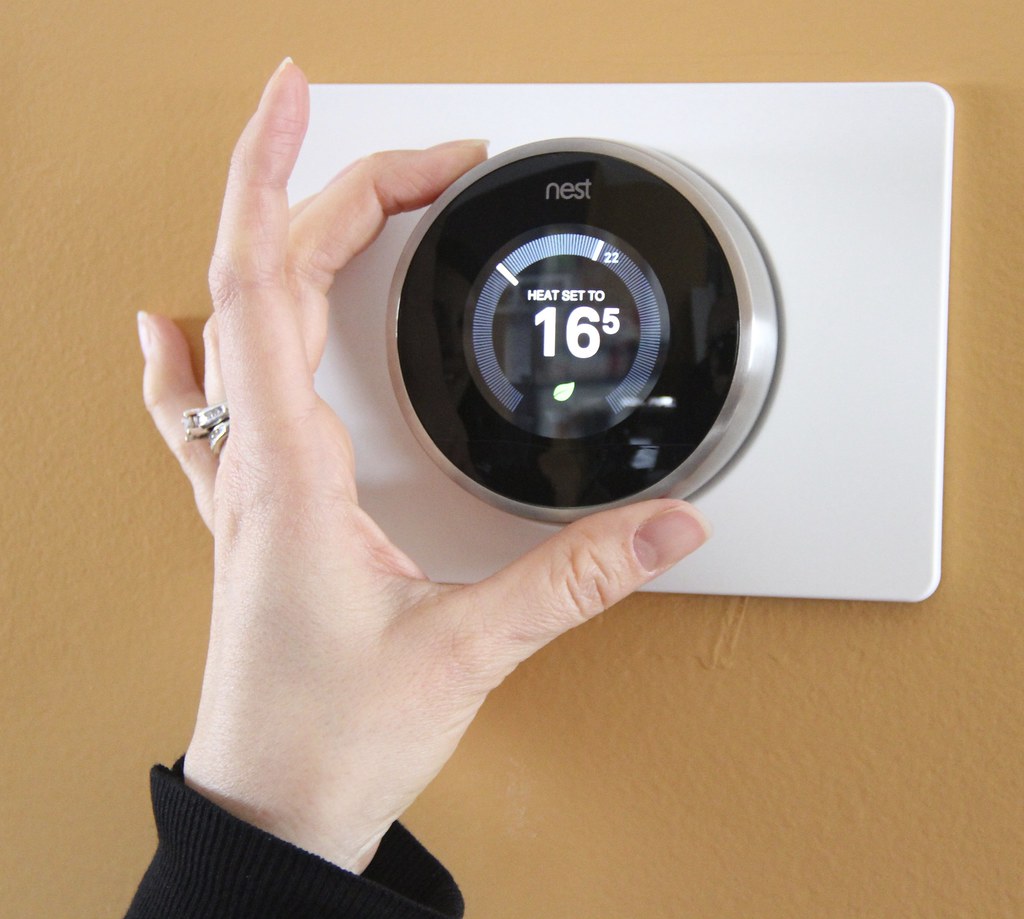
One of the most common causes of an AC not working is incorrect thermostat settings or a faulty thermostat, or a malfunctioning thermostat. Your thermostat controls when your air conditioning system turns on and off.
Check these issues: Ensure your thermostat is set to “cooling mode” rather than “heat” or “auto” fan only. Verify that the set temperature is lower than the current room temperature. Replace dead batteries. A thermostat positioned near heat sources on the wall may give false readings.
To figure out if your thermostat is the trouble, check if the display is working. Remember to consult your manual, and note that some models have reset buttons. If the problem persists, you may need a licensed HVAC technician to inspect or replace your thermostat.
Dirty or Clogged Air Filters
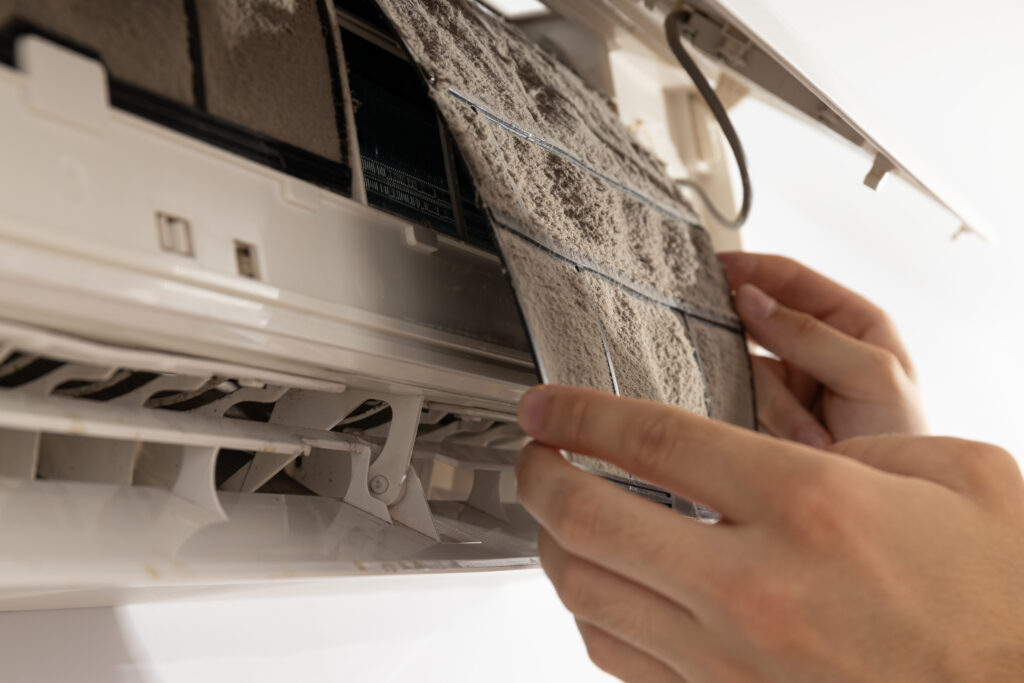
A dirty air filter or a clogged air filter is among the simplest yet most overlooked reasons for the AC not working efficiently. Your air filter captures dirt, dust, debris, and particles, but when saturated, it can restrict airflow significantly. This becomes a real hassle when you’re trying to stay cool during hot days.
Filter Maintenance Schedule:
| Home Type | Filter Change Frequency | Special Considerations |
| No Pets, No Allergies | Every 90 days | Standard square footage homes |
| With Pets | Every 60 days | Pet hair increases buildup |
| Allergies/Asthma | Every 30-45 days | Better indoor air quality |
| Multiple Pets | Every 20-30 days | Heavy dust accumulation |
When airflow is restricted, your evaporator coil may freeze, internal components work harder, your system consumes more energy, and your AC may shut down to prevent damage. Depending on your environment and the number of occupants, adjust this schedule.
This is often a free solution that takes just a minute and can contribute to better air quality and performance. For more information on selecting the right air filters, visit this comprehensive filter buying guide from Consumer Reports on air filters.
Refrigerant Leaks and Low Refrigerant Levels
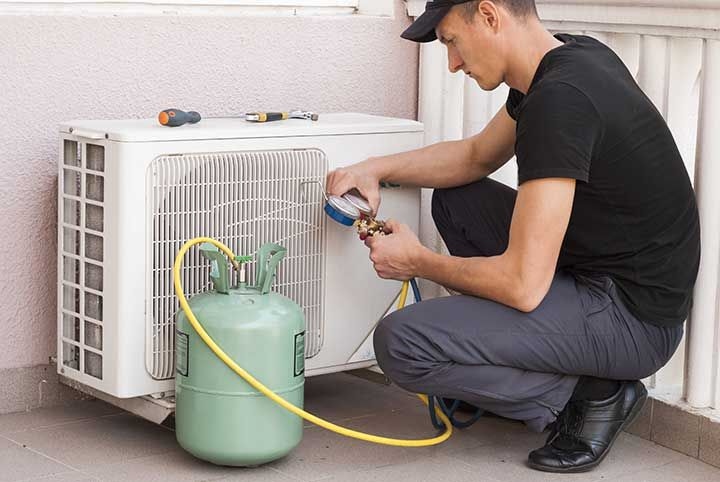
Low refrigerant is a serious issue that prevents your air conditioner from blowing cool air. Unlike gas in your car’s engine or radiator coolant in an auto, refrigerant doesn’t get “used up” – if you have low refrigerant levels, you have a refrigerant leak somewhere in your AC system. This is a bad situation requiring immediate attention.
A refrigerant leak can cause your central air to blow warm air or fail to reach the set temperature, even when the compressor appears normal. Assuming everything else is working correctly, low refrigerant is often the culprit when you get the picture of a system that runs but doesn’t cool.
Signs include:
- Your AC is running, but only blowing warm air
- Ice buildup on the evaporator coil
- Hissing sounds near the outdoor unit
- Struggling to cool your home effectively
- Higher energy bills
Important: Refrigerant leaks require a licensed HVAC technician. Never attempt to refill refrigerant yourself. A professional inspection can identify the leak, fix the problem, and recharge your system. Don’t hope the problem will fix itself – proceed with scheduling professional service.
When you talk to a tech, explain all symptoms in detail so they can diagnose the issue quickly. Working with refrigerant requires special EPA Section 608 certification due to environmental regulations.
Frozen Evaporator Coil
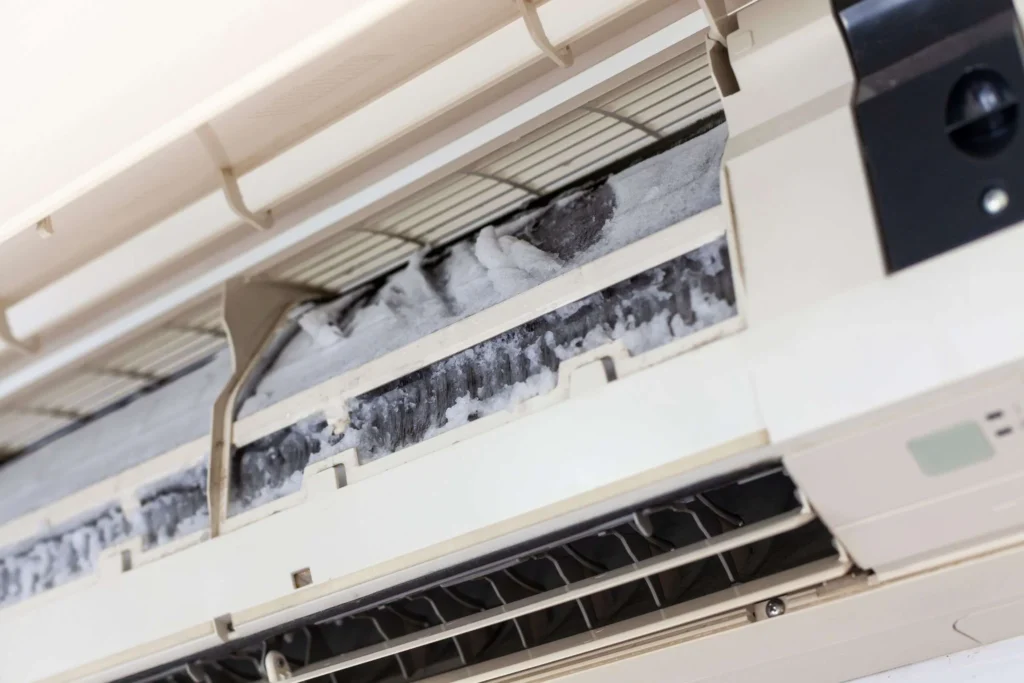
A frozen evaporator coil is a clear sign that something is wrong. When you discover ice or freezing on your AC coil, your system cannot effectively cool your home. This problem can present itself suddenly during the peak cooling season.
Primary causes include:
- Restricted airflow from a clogged air filter or blocked vents
- Low refrigerant levels are causing improper pressure
- A dirty coil that cannot transfer heat
- Fan motor problems
- Malfunctioning expansion valve or expansion device
What to do:
- Turn off your AC system immediately
- Switch the thermostat to “fan only” mode to help the ice melt
- Replace any dirty filter
- Clear obstructions around registers and vents
- Wait several hours for complete thawing
- Look for reset buttons on your system
A frozen evaporator coil often results from a lack of regular maintenance. Remember to check your system regularly, especially before you go on vacation. For more insights, check out HVAC not cooling.
Dirty Condenser Coils and Outdoor Unit Issues
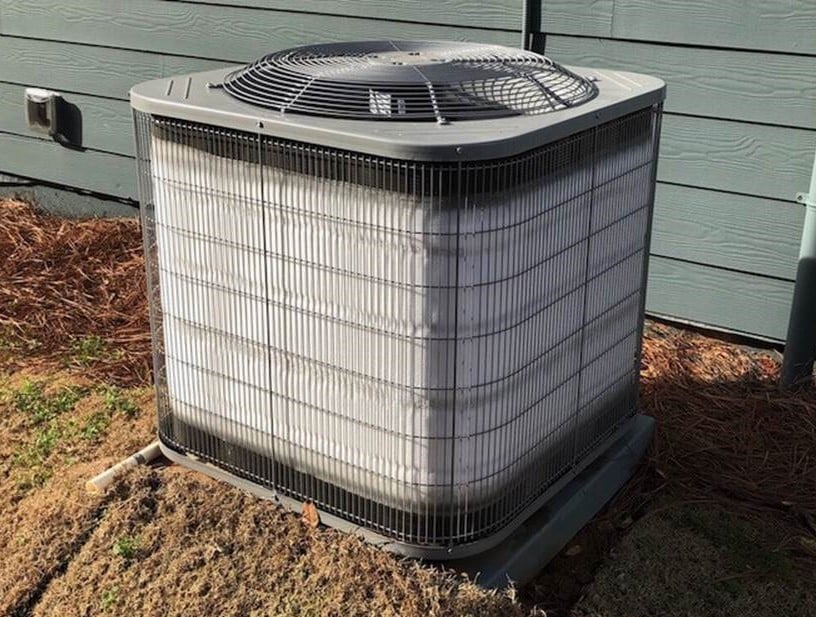
Your outdoor unit contains the condenser coil and AC compressor, making it critical for your air conditioning to work properly. Over time, dirty condenser coils accumulate dirt, dust, leaves, and debris that restrict airflow and reduce efficiency. With dozens of contaminants in the environment, your condenser takes quite a hit over the seasons.
Common Outdoor Unit Problems:
| Issue | Symptoms | Impact |
| Dirty condenser coils | Reduced cooling, higher bills | System overheating, shortened lifespan |
| Blocked airflow | AC struggles, warm air from vents | Compressor stress, potential failure |
| Debris accumulation | Strange noises, decreased performance | Fan motor damage, reduced efficiency |
Improving airflow: Keep at least 2-3 feet of clear space around the AC condenser. Remove leaves, grass clippings, and debris regularly. Trim vegetation near the unit. Check electrical terminals for corrosion.
Even in winter, when you’re not using your central AC, debris can accumulate. If you notice your HVAC making noise, it could indicate outdoor unit problems. We suggest having a professional clean these coils annually. This related issue can shorten your system’s lifespan significantly.
Electrical Problems: Circuit Breakers and Fuses
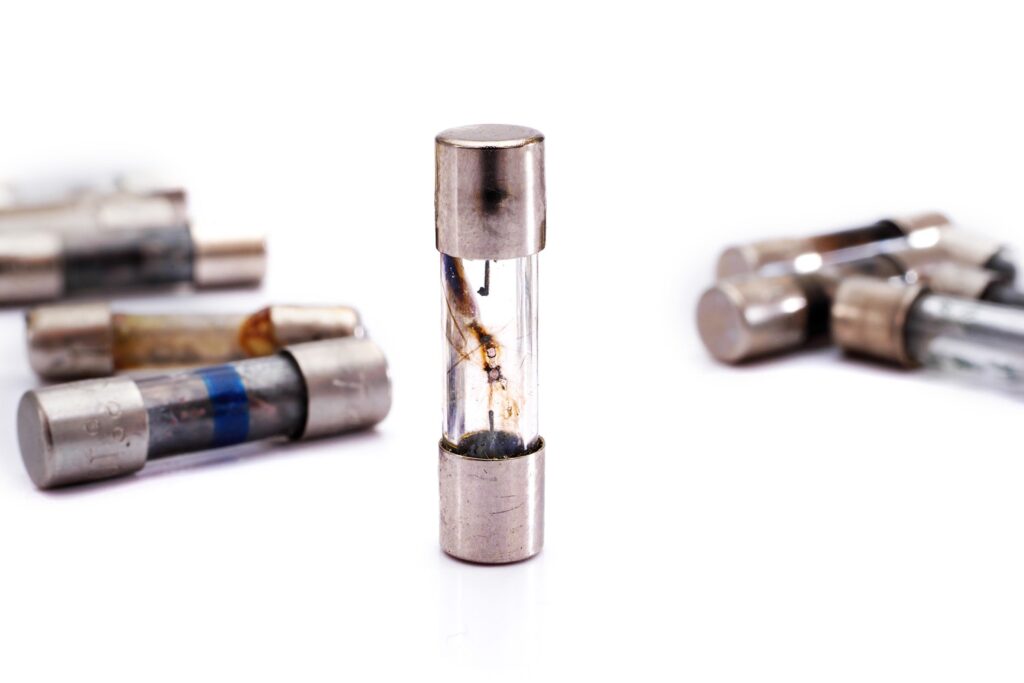
Electrical issues are another reason why your AC is not working properly. Your air conditioning system requires significant power to operate the compressor, fan motor, and other components. Problems with circuit breakers, a blown fuse, or faulty electrical connections can shut down your system. This type of trouble can be frustrating when you’re trying to find a quick solution.
If your AC compressor isn’t running, the first thing to check is your circuit breaker box. A tripped breaker is easy to spot – it will be in the middle position. Simply switch it fully to “off” and back to “on” to reset. This simple check can save you a service call.
However, if your breaker trips repeatedly, this signals a serious problem, indicating short cycling, compressor malfunction, or a faulty compressor, electrical shorts, overheating due to dirty or clogged filters or coils, or an undersized unit for your square footage.
Safety Warning: Never attempt complex electrical repairs yourself. When you search for an HVAC contractor, look for licensed professionals with good reviews and verify they’re not just advertising low prices. For urgent situations, consider our emergency HVAC repair services.
Compressor Failure
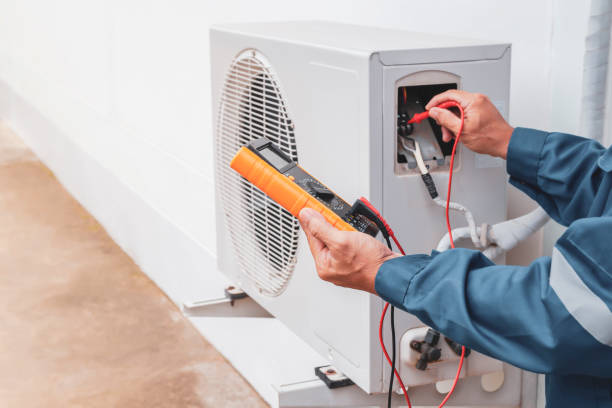
The AC compressor is essentially the engine of your air conditioning system, and a faulty compressor is one of the most serious problems. Similar to how a clutch in a car is critical, the compressor is vital for your cooling system.
Signs include:
- The compressor is running but not cooling
- Strange noises from the outdoor unit
- Hard starting or frequent cycling
- The circuit breaker trips when the system starts
- Warm air blowing despite correct thermostat settings
Common causes include:
- Lack of regular maintenance
- Refrigerant leaks or incorrect refrigerant levels
- Electrical problems, including capacitor failure (run capacitor or start capacitor)
- Overheating from dirty condenser coils
- Age and wear
- Liquid refrigerant entering the compressor
- Dirty electrical terminals
The compressor is one of the most expensive components to replace. When you get a diagnosis, talk with your technician about all the options and possibilities available. In many cases, if your HVAC compressor fails and your system is older, replacing the entire AC unit may be more cost-effective. Depending on whether your system is properly sized for your home and its age, replacement might be the smarter long-term solution. If you’re retired or planning to stay in your home long-term, investing in a new system might make more sense than adding costly repairs to an aging unit.
Understanding how long HVAC systems last and when to replace HVAC helps you make informed decisions about repairs versus replacement.
Simple Fixes You Can Try
Before spending money on professional service, try these simple fixes. These steps are engaging and straightforward, and might save you a service call.
DIY Troubleshooting: Verify thermostat settings and replace batteries. Check that both the indoor unit and outdoor unit have power. Install a new air filter if yours is dirty or clogged. Ensure all vents and registers are open. Remove leaves and debris from around the condenser. Check the circuit breaker box and reset any tripped circuit breakers. Clear the condensate drain line if clogged. Look for and press any reset buttons.
We hope these tips help you discover an easy fix. However, if these basic troubleshooting steps don’t fix the problem or if the issue persists, it’s time to call a licensed HVAC technician. Don’t let the hassle of a broken AC system ruin your comfort – knowing when to proceed with professional help is important.
When to Call an HVAC Professional
Some problems require professional expertise. Assuming you can fix everything might lead to more expensive problems.
Call an HVAC professional for: Refrigerant leak detection and repair, compressor replacement or repair, electrical issues beyond simple breaker resets, ductwork problems or leaks in your ducts, strange smells (burning, gas, or chemical odors), water leaks beyond simple HVAC leaking water issues, complete system failures, expansion valve or expansion device problems, and furnace integration issues.
A trained HVAC technician or tech has the knowledge, equipment, and safety gear to diagnose and fix complex issues. When you consult with a professional, ask for a detailed explanation. Getting answers from a qualified professional gives you the full picture and helps you make informed decisions.
Preventing Future AC Problems: Maintenance Tips
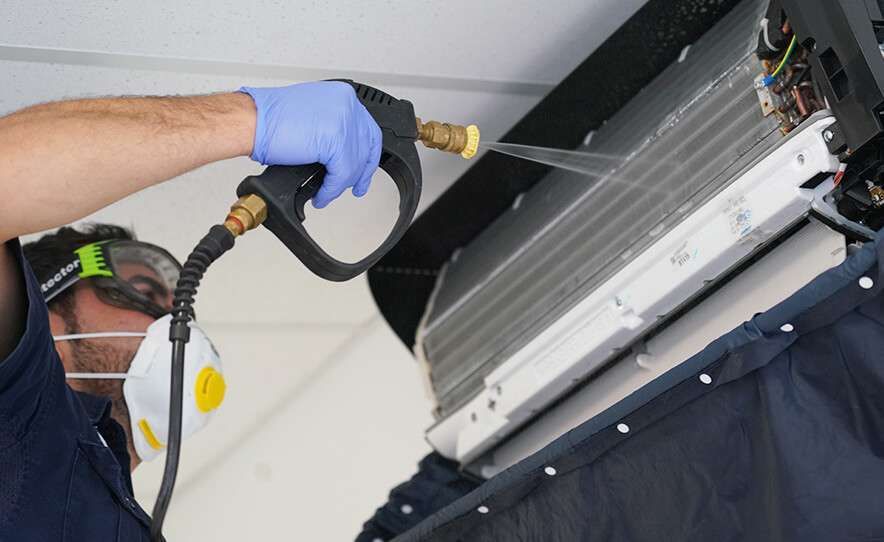
Regular maintenance is the best way to prevent your AC from not working. A well-maintained HVAC system lasts longer, runs more efficiently, and costs less to operate. Think of it as preventive care that saves you a large amount of money over time.
Essential Maintenance Schedule:
Monthly: Replace or clean your air filter. Inspect vents and registers. Check thermostat operation and batteries. Check the area around your outdoor unit for debris.
Seasonal maintenance (before summer): Professional inspection of the central air conditioning system. Clean the condenser coil and outdoor unit. Check refrigerant levels and test for leaks. Inspect and clean the evaporator coil. Test capacitors (run capacitor and start capacitor). Lubricate moving parts like the fan motor. Check electrical connections and terminals. Inspect and clear the condensate drain line. Test the expansion valve or expansion device.
Professional Maintenance Benefits:
| Maintenance Aspect | DIY Capability | Professional Benefit |
| Filter changes | Easy | Recommends proper type |
| Visual inspections | Moderate | Identifies hidden issues |
| Cleaning coils | Difficult | Complete, safe cleaning |
| Refrigerant check | Not Possible | Prevents leaks, maintains efficiency |
| Electrical testing | Dangerous | Ensures safety |
Investing in annual professional maintenance saves money by preventing expensive emergency repairs, reducing energy bills, and extending your system’s lifespan. The charge for maintenance is minimal compared to the amount of money you could spend on major repairs.
Energy Efficiency Tips: Keep your home properly insulated. Use ceiling fans to improve air circulation. Set your thermostat to 78°F for summer. Keep blinds closed during hot days. Seal gaps around doors and windows on every wall.
Consider a smart thermostat for energy savings for better control. Avoid generating heat during the hottest hours. Ensure your system is properly sized for your square footage. When shopping for a new system, look for ENERGY STAR-certified air conditioners that meet strict energy efficiency guidelines.
These related energy-saving strategies reduce the burden on your central AC system. Over a couple of seasons, you’ll notice the difference in your energy bills.
Understanding AC System Lifespan and Replacement
Even with perfect maintenance, your AC system won’t last forever. Understanding when your system is nearing the end helps you plan for replacement rather than facing unexpected failure during hot weather. This empowers you to make informed decisions rather than assuming your system will keep coming back to life after each repair.
| Equipment Type | Average Lifespan |
| Central Air Conditioning System | 15-20 years |
| AC Compressor | 10-15 years |
| Window/Portable Units | 8-10 years |
| Furnace Heating Component | 15-20 years |
Signs it’s time to replace:
- Your system is over 15 years old.
- Repairs are becoming frequent and costly (over 50% of replacement cost).
- Your energy bills keep increasing.
- The system struggles to maintain the desired temperature on hot days.
- Your home has uneven cooling.
- The system uses outdated refrigerant (R-22/Freon).
Sometimes complete system replacement is more economical than continuing to fix an aging unit. Modern systems are significantly more energy-efficient. When you consult with professionals and compare options, you can make the best decision. Getting multiple quotes is free and helps you understand the true picture of your possibilities.
The Cost of AC Repairs
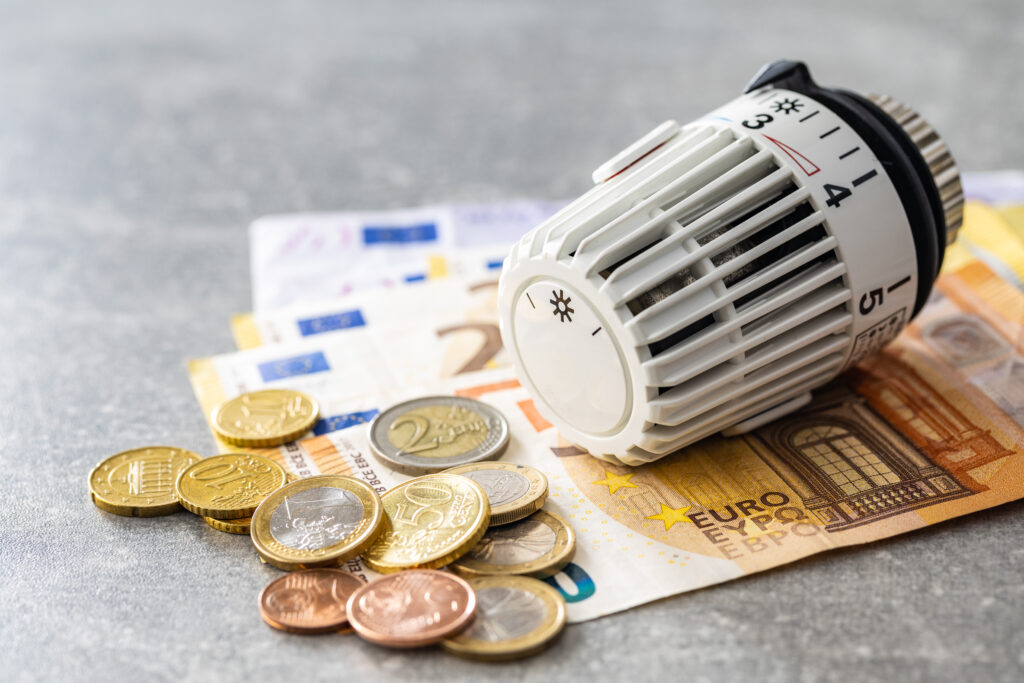
Understanding potential repair costs helps you budget when your AC is not working and requires professional help.
Common repair costs (approximate):
| Repair Type | Typical Cost Range | Complexity |
| Thermostat replacement | $100-$300 | Simple |
| Capacitor replacement | $120-$400 | Moderate |
| Refrigerant refill | $200-$600 | Complex |
| Condenser fan motor | $300-$800 | Moderate |
| Evaporator coil | $650-$1,500 | Complex |
| Compressor replacement | $1,200-$2,800 | Very Complex |
| Complete system | $3,000-$12,000+ | Full Replacement |
Several factors affect the final charge: Your location and local labor rates, age and brand of your AC unit, accessibility of components, warranty coverage, time of year, and job complexity.
Money-saving tips: Address issues early before they contribute to additional damage. Compare quotes from multiple HVAC company providers – don’t just trust advertising. Check your warranty status. Schedule maintenance during off-peak seasons. Ask detailed questions and get written estimates. Search for contractors with good reviews and proper licensing.
Never let cost prevent you from addressing serious problems. Delaying necessary repairs often leads to more expensive damage. Depending on the severity of the issue, waiting could turn a simple fix into a bad situation. When you talk to contractors, ask them to explain options and suggest the best course of action. Getting answers helps you make the right decision, no matter how complex the problem might be.
Conclusion: Keeping Your AC Running Smoothly
Understanding why your AC is not working properly empowers you to take action quickly, whether a simple fix like replacing a dirty air filter or calling a professional for complex issues like a refrigerant leak or faulty compressor. Regular maintenance, prompt attention, and knowing when to seek professional help are essential for keeping your air conditioning system running efficiently throughout hot summer days. Remember that prevention is always better than dealing with a large repair hassle when your system fails.
Don’t wait until your system fails on the hottest day of the year. If you’re experiencing cooling issues or it’s time for annual maintenance, contact Callidus Air today. Our experienced technicians can diagnose problems quickly, provide honest recommendations, and restore comfort to your home. We hope to help you discover the solution to your cooling problems and stay comfortable year-round.
Frequently Asked Questions About AC Not Working
Why is my AC running but not cooling my house?
If your AC is running but not producing cold air, the most common causes include low refrigerant levels, a dirty air filter restricting airflow, a frozen evaporator coil, dirty condenser coils, or incorrect thermostat settings. Start by checking your filter and thermostat. If those aren’t the problem, you likely need a licensed HVAC technician to inspect your refrigerant levels and coils.
How often should I change my air filter?
For most homes without pets or allergies, change your air filter every 90 days. With pets, change it every 60 days. Homes with multiple pets or residents with allergies should change filters every 20-45 days. A clogged air filter is one of the most common causes of reduced cooling, so regular replacement is essential for keeping your air conditioning working properly.
Can I fix a refrigerant leak myself?
No, refrigerant leaks must be repaired by a licensed HVAC technician. Working with refrigerant requires special certification, tools, and knowledge. Attempting DIY refrigerant repair is illegal, dangerous, and can severely damage your AC system. If you suspect low refrigerant, contact a professional who can locate the leak, repair it, and recharge your system to the correct refrigerant levels.
How long should I wait after my AC freezes before turning it back on?
If your evaporator coil has frozen, turn off your AC system and wait at least 24 hours for complete thawing. You can speed the process by running just the fan (set thermostat to “fan only”). Before restarting, replace any dirty filter, ensure vents are open, and check that nothing is restricting airflow. If the frozen coil returns after a restart, call an HVAC professional, as you likely have low refrigerant or another underlying issue.
Is it normal for my AC to run constantly on very hot days?
On extremely hot days, it’s normal for your central air conditioning to run more frequently or continuously to maintain your set temperature. However, if your AC runs constantly and fails to reach the desired temperature, you may have issues like low refrigerant, dirty coil problems, an undersized system for your square footage, poor insulation, or efficiency problems. If your system runs continuously for several hours without bringing the temperature down, contact an HVAC technician to diagnose the problem and prevent higher energy bills.

